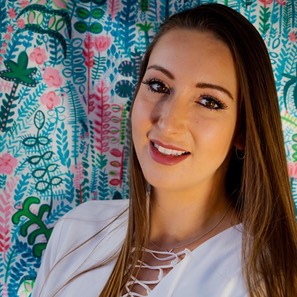Samantha Dholakia, Local Mum and the founder of SPD Tuition and Coaching, is blogging for us about all things coaching
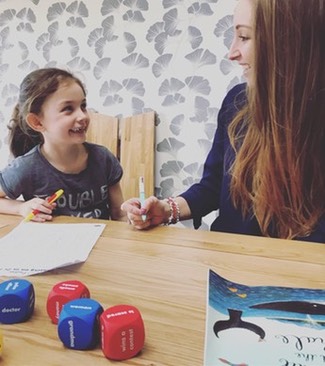
Are you a Bully?
The internal versus the external world...
As human beings, big and small, we are constantly juggling two worlds, the internal and the external.
According to trusty Google, a bully is defined as someone who is ‘habitually cruel, insulting, or threatening to others who are weaker, smaller, or in some way vulnerable.’ This definition got me thinking, it made me curious, what does bullying truly represent and how does it affect each and everyone of us?
All behaviour is communication. Whether we are conscious about it or not, we are constantly communicating with each other, be it positive or negative experiences that we are sharing. Bullying is often spoken about in education, but it is not just something experienced by children, it is among us adults too. I would even go as far as to say that we can be guilty of self-bullying. By the above definition, bullying is about behaviour towards weakness and vulnerability, and don’t we all hold some of both within us? Perhaps this is really where bullying begins?
I believe we can all be subject to ‘habitual cruelty’ and insult without even leaving the house, and no I am not referring to the various social platforms that we receive regular input from, I am talking about that inner voice that we all have. The one that takes a thought and runs with it.
Having worked in education for nearly 20 years, from nursery nursing to deputy headship, consultancy and teacher training, I have seen my fair share of ‘bullying’. I have seen both children (and adults) on both sides of the metaphorical fence and it has always sparked a curiosity. How, as human beings, can we be so ‘cruel’ to those around us? With so much pain and suffering shared historically, how have we not managed to push past this need to ‘hurt’ one another?
Bullying stands unwavering as an issue for our children and us adults. With so much of it going unreported and unnoticed, I believe the reason for this is really quite simple. It is ‘normalised’ from a young age in different forms. We learn to practise ongoing ‘cruelty’ internally and the more pain we feel, the more pain is transferred to those around us as an attempt to lessen what we’re feeling- at least for a short time, until that urge, desire and overwhelming sense of emotion piles back up.
Like everything, this is learned and developed as we grow, and although not all of us ‘bully’ others, we are all pushing that pain somewhere. Surely, using our own metaphorical whipping stick falls under that definition of bullying…As a society, are we inadvertently encouraging bullying from within? And what can we do about it?
It starts with us.
How often do we as adults give ourselves a compliment? Yes, I did say give OURSELVES a compliment… the chances are that this is never or not very often. We don’t tend to practise true internal kindness, let alone voice such kindness out loud for all to hear - shame of blowing our own trumpet. We live in a world that suggests self-celebration, promotion and appreciation comes branded as boasting, being big-headed, arrogant and even vain. This notion that we are able to share our feelings of self-disappointment, annoyance and frustration leads us to practise these accepted ‘norms’ both internally and externally.
So how do we work on this to make a change? How do we overcome that inner bullying and prevent it from spilling over into the world?
Practising self-appreciation and feeling able to share that with others is a huge part of building confidence, self esteem and inner happiness - which of course allows us to manage both internal and external worlds more effectively. It doesn't mean that we do not notice when things are hard, or don't go well - it simply allows us space to balance the 50/50 split that is life. It allows us to grow through our adversity and create new ideas through our fears rather than avoiding them.
We all have a huge part to play here. The breaking down and understanding of ‘social norms’, expectations, and the behaviours of those close to us are how we define and connect our internal and external worlds. Yes, a pang of parental guilt is likely to occur for any parents here as we reflect on and try to catch ourselves being human… what we do and say impacts our children whether we are intentional about it or not.
I often support parents and practitioners in understanding the science behind behaviour with all of this in mind. With behaviour being communication, if we can learn the language we can truly make sustainable change - both for ourselves as adults and the children and young people around us for generations to come.
So, here are four things that you can do to support that ‘inner bully’ and build up that vulnerable part of us, so that not only do the words of others have little effect, but the words selected by our minds are more conscious and less ‘habitually cruel’.
- Practise Gratitude
We hear it all the time in social media but gratitude is such an important skill to develop, master and pass on. Not only does it create happiness and emotional balance it also offers this to others. When we are truly grateful for something we can only feel that one emotion in that moment, it leaves no space for others to muscle in, and when we express true gratitude it is received in the same way. There really is a science behind it!
- Give daily compliments
Complimenting is a great way to give yourself practice at inner and outer kindness. It allows us to break down barriers, feel confident and model the words that we want to hear, use and receive. Remember, giving a compliment can be done in so many ways, it can be tagged onto appreciation or out of the blue. Most of all it can be to anyone - including ourselves! Whether it is about what we see, hear, feel or achieve, a compliment can go a long way to making the changes we need to overcome both internal and external struggles.
- Catch your words
An activity I use with all I work with and one that shines a light on our habits. What words do you say a lot? Catching the words that do not serve you and that ignite that inner burning can really help in making a shift. In order to move forwards in any journey we need to know where we are heading and from where we are coming from.
- Turn expectations into appreciations
Many ‘cruelnesses’ grow from the expectations placed on ourselves and others. What we expect them to wear, say and do impacts how we see each other and of course how we behave and communicate. If we can turn our expectations into appreciation we no longer feel that desire to pass on pain and discomfort. We no longer have the desire to ‘bully’ as we are conscious of our thoughts and outcomes.
In November we celebrate anti-bullying week (Monday 14th - Friday 18th November) and the launch of our support sessions for parents, practitioners and young people. If you would like to work on your inner voice or need support in dealing with bullying from the external world, you can email us directly at spdtuitionandcoaching@gmail.com for more information.
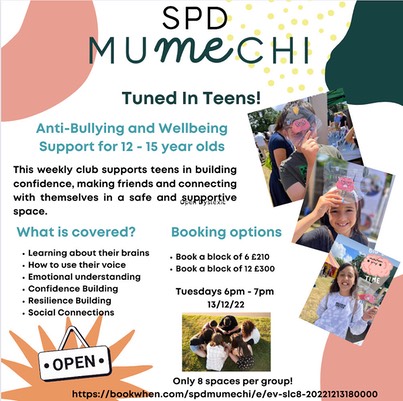

Contact:
Samantha Dholakia
Founder, Coach, Consultant, Trainer
SPD Tuition And Coaching
Tel: 07884271025
Email: spdtuitionandcoaching@gmail.com
https://spdtuitionandcoaching.co.uk
https://spdtuitionandcoaching.co.uk
October
Being reborn, Motherhood’s ebirth - heading back to work!
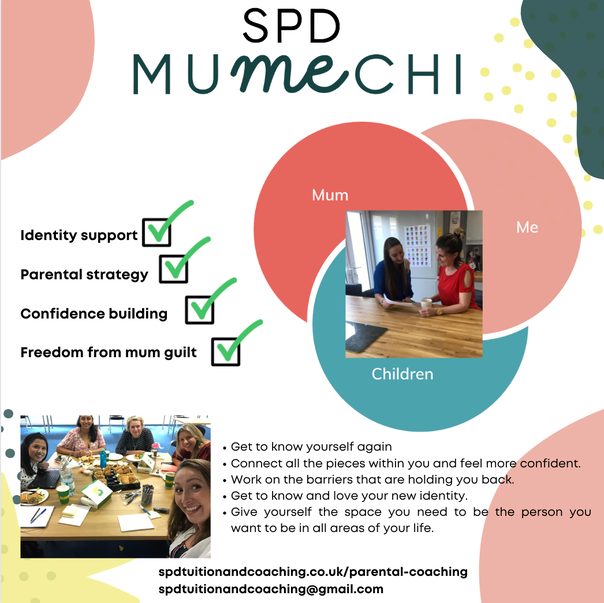
In a world where motherhood is so often overlooked and underappreciated by society I am so pleased to be part of an increasing amount of support that is now out there for new mums.
As a new mum myself I was able to find (if I looked hard enough of course) support for birthing my baby, feeding him and keeping him alive and thriving. I was able to connect with other mums, go to playgroups, pandemic permitting, and begin to embrace this new world I had entered. As a new mum it can feel like you yourself have been reborn. The world we experience feels different, the relationships we have with people can feel different and sometimes even the food we once loved doesn't taste the same! The loss of that bump we have cradled for so many months and the clothes that are now not maternity or pre-baby can feel confusing and even frustrating at times.
Our rebirthed identity truly kicks in during that 4th trimester bubble of exhaustion, adrenaline and love…followed by more exhaustion. This 12 week period is not only the time our baby is developing at a phenomenal rate but it is a time for finding your feet as the new you with feeds, naps and trying to leave the house can be both rewarding and overwhelming.
And Mums, it doesn't stop there!
Those maternity leave days can be full and fulfilling for sure, but they can also be lonely, tiring and even a little unfulfilling...Yes I Said it!
As mums we often feel that the right answer is ‘I love spending every moment with my children and wouldn't want anything more’... and for some of us this is absolutely the case. We can get all of our fulfillment through and alongside being at home with the children. However, this is not the case for others of us. AND THAT IS OK! There is no right or wrong way to feel as a mum and one feeling does not make you a better or worse mama.
What happens when the maternity bubble pops and we find ourselves in between worlds?
The world we once knew can feel so far removed that it is no longer recognisable, feeling unfamiliar and at times unwelcoming! Yes, you have got it, I am talking about the world of work! Whether it is through financial obligation, the love of the work we do, or the need for mental stimulation outside of the mum role…. many of us mamas hit yet another shift in identity when our maternity leave comes to an end.
AND WOW, how becoming a mother impacted the way I saw my work. The way I responded to my emails. The way I arrived each morning. The way I left each evening. The way I responded to last minute requests or demands that impacted my day and could potentially run past the time I finished. What had once been a huge part of my passion, my purpose and my fulfillment had become a chore, an inner conflict and a source of the biggest, and most all encompassing, mum guilt that I have ever experienced.
So what happened? Why does mumlife spill over so heavily into all we do and how do we truly make the adjustments we need in order to survive, and thrive, ourselves?
I believe the truth is in the purpose. During our pre-parenting days we were able to search, find and immerse ourselves in things that gave us purpose and fulfillment. For many our work may have been a huge source of this, providing a large part of our identity and offering a sense of achievement and fulfillment. Sometimes that was coupled with, or supported by, hobbies and other outlets such as that daily run, trips to the gym, a quick swim, that book we disappeared into, or a great film that we loved to absolve ourselves into. Our purpose may not have even been questioned as there was nothing rivaling it.
I know I am not alone when I say mum time and pre mum time moves very differently, that hour turns to 20 minute and that 20 minutes turns to less than five when working with mum time. The things that once fulfilled us and provided us with purpose may no longer fit the schedule or perhaps simply just don’t fit with our new identities. Identity is certainly an area I work on often, not only with the mums that I work with but also for myself, and our work identity is a huge area that shifts once becoming a mum. Unfortunately, too often as mothers, we forget that the effects of these shifts ripple into every area of our lives in different ways. Providing us with different, but equally as impactful, challenges.
As we step into these new shoes, and out of the door into our new world we can find ourselves feeling unclear, unsure and unprepared for what we are to do next. As a mums' career/business and life coach I work with clients in this area A LOT! Of course, we are all human and sometimes none of the shoes fit well, however, and it appears that we all seem to find ourselves dropping into one or another of three main pairs of mama shoes - when it comes to work .
So, when it comes to working life, what type of Mama are you?
Are you a new-purpose Mum?
As a new mum it can feel like your purpose is no longer the same.
That you have either the calling to stay with your little ones as long as they need you and provide them with all they need or a call elsewhere, outside of the role you once had. You may no longer have that fulfilled from your current job, but not have the desire to start your own thing or go freelance. The idea of running your own business might not ignite your inner fire and you may feel constricted by time. You may feel fulfilled through staying at home with your children, starting a new hobby or developing social connections. For other “new purpose mummies”, it might be that they want a new role, whether that is parttime or fulltime, it is the change of direction that they are exploring, ways to support the world in a new way.
Are you a back-to-work Mum?
For some back to work mummies the role they left is still the one they love and still provides them with what they need. They may not want to change the role and are able to step back into it with confidence and ease. However, this is not always the case and for many their roles might not feel the same. Although the role is what they want to do, their priority has shifted and their needs and expectations changed. They may want to stay in their field but look for flexibility to support with their new time restraints or more financial security or a company more inline with their new values.
Are you the build-something-of-my-own Mum?
Perhaps you have found a new calling but want to create or deliver it in your own way. Having that desire for a new challenge that allows you to step into a new world and work to your own rules. For some mummies, those old shoes don’t fit but there are none premade that feel right either. They want freedom, challenge, passion, fulfillment and flexibility in a world they themselves run. This identity shift has enabled them to not only see the world differently but see the opportunities they have to support that change. This can also be combined with that “new purpose mummy” feeling of finding something totally new on your bow and wanting to run with it.
Perhaps you are a mixture, perhaps you are heading back to work to a job you love but are wondering if it is still right. Wondering if you want to start your own thing or make a change….
Knowing what you want isn't always easy, especially when it is mixed with knowing what you ‘should’ do. The fear of financial struggle, the fear of not being good enough, not being capable, not being confident enough or even just the overwhelming feeling of not having the time to think about it.
The truth is, knowing the answer to our questions not only increases our capabilities, productivity and confidence at work, but it can also do the same at home too! Those mumlife spillages work all ways…. The whole 360!
Grab a pen and take some time to ask yourself...
WHO ARE YOU?
What are the things in life that you truly value?
Is the company/role in alignment with these?
What fulfillment do you get and from where?
Does what you do give you the fulfillment you need?
What do you love/hate about your role?
If anything, what would you like to change?
Who has the power to make that change?
If you would like to explore more about your new values, dig deeper into your new identity or shine a light on where you would like to be within your work life, you can book your free 30 minute coffee catch up directly here.
Local Mums Discount
All online mum members will receive a 10% off our MUMECHI transitional support sessions starting in December. Where we explore a range of strategies and activities together to support the following areas of mum life. For more information and to receive your discount, email me directly with the code #Onlinemums10
Career changes
Identity
Shifts within relationships
Stress management
Time Management
Mum Guilt
Behaviour management
Wellbeing and self care

Contact:
Samantha Dholakia
Founder, Coach, Consultant, Trainer
SPD Tuition And Coaching
Tel: 07884271025
Email: spdtuitionandcoaching@gmail.com
https://spdtuitionandcoaching.co.uk
https://spdtuitionandcoaching.co.uk
September
It's this week!
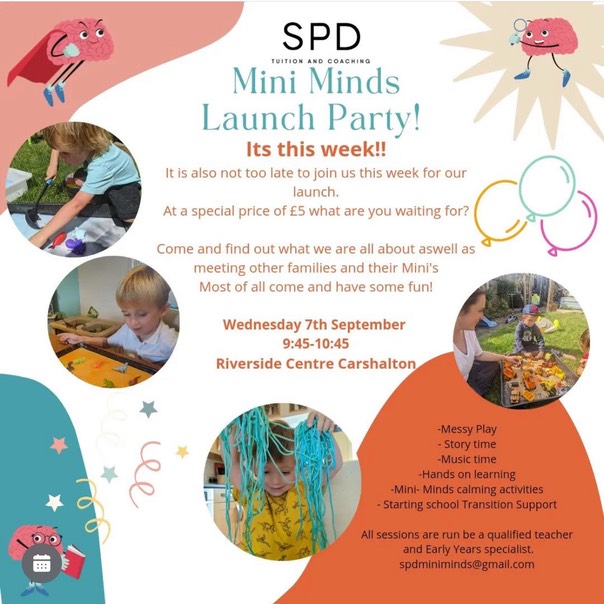
It's also not too late to join Mini Minds this week for our launch.
At a special Local Mums price of £5 what are you waiting for?
Come and find out what we are all about as well as meeting other families and their Minis.
Most of all come and have some fun!
Wednesday 7th September
9:45-10:45
Riverside Centre Carshalton

For more information, or to book your space, you can email me directly or CLICK HERE!!
Contact:
Samantha Dholakia
Founder, Coach, Consultant, Trainer
SPD Tuition And Coaching
Tel: 07884271025
Email: spdtuitionandcoaching@gmail.com
https://spdtuitionandcoaching.co.uk
https://spdtuitionandcoaching.co.uk
August
Is your child ready to skip into those school gates?
My goodness, September felt like a long way away, all of a sudden it’s August and our mini humans are about to embark on an exciting (and potentially nerve wracking) adventure…starting “Big School”.
As parents the long-term goal for our children is for them to have positive mental wellbeing, secure social relationships with others and ideally to achieve academically. But where do we get started to support them with this?
We have all seen the many posts about preparing children for school, and yes there is a whole host of great information out there… but they don’t seem to cover the fundamentals of getting your child skipping ready rather than walking!
Just like building a house, children need to be supported by “strong foundations”. These foundational skills come in three main areas: physical development, language and communication, and personal, social and emotional development.
Here are three top tips to ensure your child is physically learning ready, that you may not already know!
- Practise big muscle movements inside and outdoors - these help develop writing and reading.
- Play games that involve them using both sides of their body - This helps reading, focus and attention.
- Give your child opportunities to strengthen their core - This supports attention, focus and their ability to sit for sustained periods of time.
Last month we launched ‘Skipping into September, Primary Prepared’ and have been supporting parents in getting their children truly ready for school. The first session has been so well received we are very excited to be running the next two.
Here are some things parents found useful from our first session, which they are going to try with their children, to help build these ‘strong foundations’:
- Exercises to develop ‘Primal Reflexes’ and motor skills
- Breathing exercises
- Breaking instructions down into shorter, more manageable ‘chunks’
- Using a whiteboard to create Visual Schedules at home
- Creating opportunities for the child to practise asking for help
- Creating a Visual Emotions Board to start developing emotional vocabulary
There will be a whole host new ideas in our next session, focusing on all the things you can do with “a few days to go” until starting “Big School”.
The session is online at 8pm on Wednesday 31st August and you can book now at spdmumechi.bookwhen.com
Spaces are very limited to ensure we offer the very best to each family and we would love to have you join us!
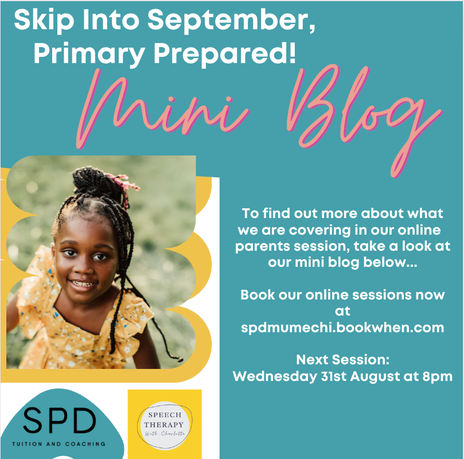

For more information, or to book your space, you can email me directly or CLICK HERE!!
Contact:
Samantha Dholakia
Founder, Coach, Consultant, Trainer
SPD Tuition And Coaching
Tel: 07884271025
Email: spdtuitionandcoaching@gmail.com
https://spdtuitionandcoaching.co.uk
https://spdtuitionandcoaching.co.uk
Looking within…

‘What goes up must come down’, an old saying, over time we have come to understand that this is of course set in the science of gravity. The idea that if something goes up into the air, it must come down, is familiar to us. A notion we take for granted, one we teach in our schools as part of understanding the world around us.
So much of our time is spent exploring the world around us, the natural occurrences and theories of that beyond our reach, but for all our learning and teaching of the external world there is still much to understand. It is fascinating how much we can know, whilst knowing not much at all. Which of course, fuels our curiosity and desire to learn and deliberate on that external world even more. And this curiosity is sparked even in our youngest minds…
Like the external world around us, our internal world is full of natural occurrences and concepts beyond our understanding. The way in which our mind, body and behaviour works is not only fascinating but imperative to our progression and development.
How much curiosity and exploration of our internal world is sparked in our children?
The answer, based on my experience within the education system, is very little!
We do not teach our children about our internal world. We do not teach them about their minds and their emotions. About how they are linked and how we can manage and control them with practice. Our internal world, the world that is so crucial to all areas of success in life, remains a mystery to us all.
How much of a difference could we make if we knew more about it?
Mental health, like physical health, affects all of us. It drives our successes, challenges and failures and yet we sit behind the wheel of our minds without instruction, guidance and awareness. As adults this is something we often do not know and because of this our children follow in our footsteps as behaviours, traumas and struggles are passed down through generations… Ok, it may sound like we are all menatlly doomed but we actually have the power to make the most incredible change.
This is why I do what I do, and why I - with many others in the field - am supporting families, children and educational/care settings in sparking curiosity and teaching children (and grown ups) about the important and incredible internal world.
Sustaining good mental health is all about awareness, reflection and forming habits, so here are some top tips to start to share, explore and help you get to know your internal worlds together as a family.
- Use your emotions as signposts
We are taught (and still teach) from a young age that we need to ‘use our words’ or ‘stop crying’ ‘don't be mad’ but this not only stifles the processing of our emotions, kicking the metaphorical can down the road, it creates a disconnect that prevents us from understanding our emotions as we develop. Begin to acknowledge, name and describe your emotions - notice when you feel them and share this with each other: ‘ I am feeling frustrated because I wanted to…..but was not able to’.
- Recognise behaviour as communication
Whether it is our own behaviour as parents or the behaviour of our children the way we behave indicates the emotions we are having. Reflecting and spotting repeated behaviour can help identify our emotional triggers and enable us to make changes. Verbalising things such as ‘ I shouted then, I am feeling angry because….’ gives a positive narrative to our internal world and allows us to process and move forward more quickly.
- Guard your thoughts
Our thoughts create our emotions, so choosing what we think deliberately and with purpose can shift a great many of our actions and results. So often we allow our mind to run freely, on uninterrupted loops that trigger our fight or flight responses. This not only prevents us from thinking logically, but also impacts our physical health. Taking ownership of our emotions through our thoughts is tough but empowering. Recognising and verbalising ‘ I am feeling…. because I am thinking….. rather than ‘I am feeling…..because you/someone did…..’ can change how we experience situations and most importantly how we sustain connections.
We can create, and sustain, positive mental health habits through adapting 3 core elements, our physiology, beliefs and internal and external language choices. SPD Tuition and Coaching works to support educational and childcare settings, parents and children in developing the skills, the understanding and the self belief they need in order to self-regulate, and co-regulate emotions. It is through sharing, discussing and exploring these processes that we can spark the interest and excitement that leads to truly mastering our internal worlds, as well as our external.
For more information about our educational and childcare setting training support, family or children programmes, you can contact SPD Tuition and Coaching directly via email at spdtuitionandcoaching@gmail.com, or via phone on 07884271025. All programmes have habit-building, understanding the science behind behaviour and creating an environment of self and co-regulation at their core.
A quick reminder for anyone with children starting school in September -
I am running some sessions, for parents and practitioners, that support children in getting truly prepared for starting school (see July’s blog below). These sessions are to ensure children entering the new school year, not only have an academic grounding, but a physical and emotional one too!
If you or anyone you know has, or works with, a child that is starting school in September, please do share this with them as we are on a mission to support as many families as we can.
⭐️Dates have just been released!⭐️

For more information, or to book your space, you can email me directly or CLICK HERE!!
Contact:
Samantha Dholakia
Founder, Coach, Consultant, Trainer
SPD Tuition And Coaching
Tel: 07884271025
Email: spdtuitionandcoaching@gmail.com
https://spdtuitionandcoaching.co.uk
https://spdtuitionandcoaching.co.uk
July
Primary prepared
We may be enjoying (or avoiding) the heat right now, but we all know how time flies and September is just around the corner!
I have some very exciting sessions coming up, for parents and practitioners, that support children in getting truly prepared for starting school. I have teamed up with the amazing speech therapist Charlotte and we are offering accessible sessions to all, with the aim to ensure that children entering the new school year not only have an academic grounding but a physical and emotional one too...
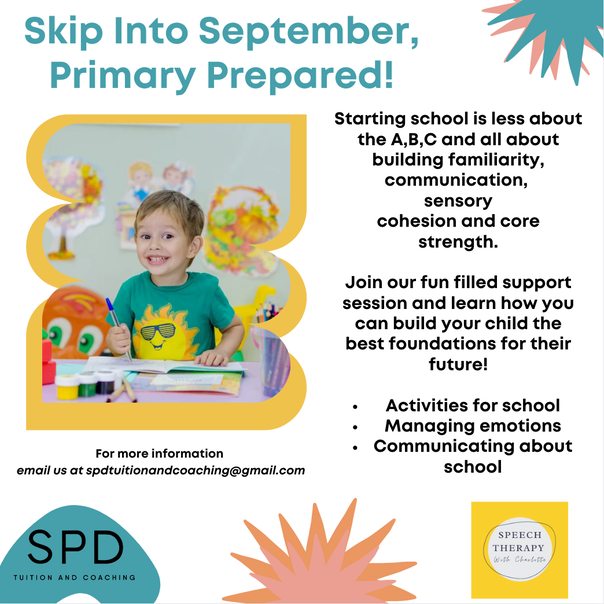
If you or anyone you know has, or works with, a child that is starting school in September, please do share this blog with them as we are on a mission to support as many families as we can.
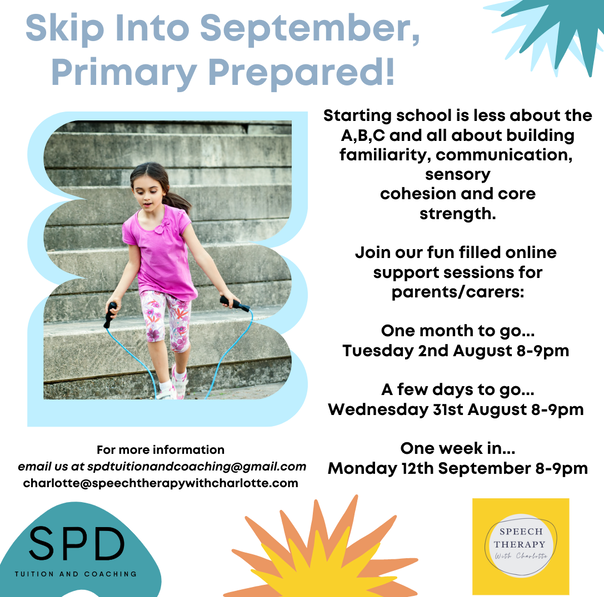
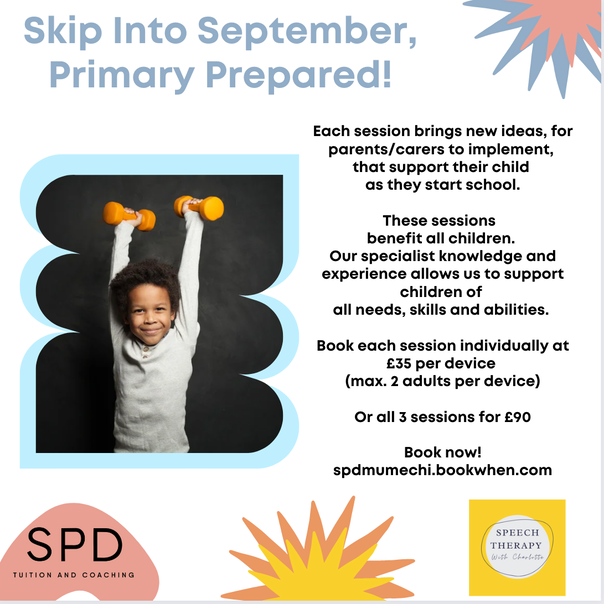
For more information, or to book your space, you can email me directly or CLICK HERE!!
We look forward to supporting you, or those you may know and care for, during this exciting transition.
Have a great day, and enjoy the sunshine!
Best wishes,

For more information, or to book your space, you can email me directly or CLICK HERE!!
Contact:
Samantha Dholakia
Founder, Coach, Consultant, Trainer
SPD Tuition And Coaching
Tel: 07884271025
Email: spdtuitionandcoaching@gmail.com
https://spdtuitionandcoaching.co.uk
https://spdtuitionandcoaching.co.uk
June
‘Oh snap’ parenting
'You’re not listening! What’s wrong now? Why are you doing that?
Mamas, at some point we’ve heard ourselves say these things!
And despite the best wills in the world, the fact is that ‘losing your temper’ is down to science.
So, why do we ‘snap,’ and how can we make change?
Don’t worry, I’m not going to tell you to take a bath or go for a run, although these are useful there’s more to it!
The reason we ‘snap’ is both innate and ingrained! As human beings we are fundamentally built to survive and we snap because we are pulled too tight and are often in survival mode.
Managed by the chimp, the lizard, or more scientifically, the Amygdala, this part of the brain is constantly deciding what to fear.
Good news...WITH SUPPORT WE CAN OVERRIDE IT!
It only takes one person to make a change so this is why it always starts with us. So let’s look at how we can do that!
Our amygdalas are ‘set off’ through big emotions such as stress, anxiety, anger, frustration, sadness and overwhelm. To start to change our ‘Oh snap’ parenting habitats we first need to understand that without this knowledge, and the tools to make change, our behaviors are subconscious.
It is our nervous system reacting to stress and emotion... and this is the same in our children! Unfortunately, children rely heavily on this part of the brain until around the age of 10 when the ‘logical thinking’ part of the brain, known as the prefrontal cortex, starts to develop, preventing them from managing their own emotions.
Did you know that all emotions come from the thoughts we practice?
Oh yes, it is true! All emotions come from our practiced thoughts - so here’s how we OVERRIDE our brains and make sustainable change.
1.Being aware of what we’re practicing without judging it. Noticing what is there forms the foundation to any change.
2. Choosing one change to practice. Taking on too many changes is overwhelming and causes our brains to retreat.
3. Aiming for progress not perfection. Talking about the changes we want to make supports our momentum.
For anyone experiencing these ‘snap’ moments, wanting to make a change, do email us at spdtuitionandcoaching@gmail.com for more information.
May
How to talk to your kids effectively
Tired of repeating yourself?
Struggling to keep your cool?
Want some strategies to ease the strain of parent life?
You are not alone!
So many of the parents I work with came to us for exactly the same reasons... because good parenting is hard work and can wear you out and grind you down!
If we are not worrying about their safety, their development or their learning, we are battling challenges such as food refusal, emotional meltdowns and sleep deprivation. All of which impacts us not only as parents but in all of our roles!
Perhaps you are you hearing 'NO' a lot?
Or are they requesting one parent over the other at specific times?
All parenting challenges are:
Natural and not personal
Due to an increased desire for independence and control
Part of them understanding, challenging and exploring the world.
My top tips to supporting and empowering our children:
Be clear and compassionate
Children need to hear what is happening step by step. Being clear about what will be happening next is a great way to support them.
Allow them to make choices during routines.
Offering other options such as which story to read, which pjs to wear helps them feel in control and empowered.
Acknowledge and comfort
Standing by your words is important, but showing understanding is even more important! Recognising emotions, talking them through what is happening to give them a safe space, using cuddles and humour to support them.
If you would like more support in how best to talk to your toddlers, teens in betweens with challenges such as bedtime routines, balancing behaviour, effective communication or supporting them in their learning, you can now book your space on my 'Talking to Toddlers and Beyond' session - Live support session on 6th, 23rd and 30th June, at 8pm. OR Download our pre-recorded parent support session to watch in your own time.
For more information email us at spdtuitionandcoaching@gmail.com
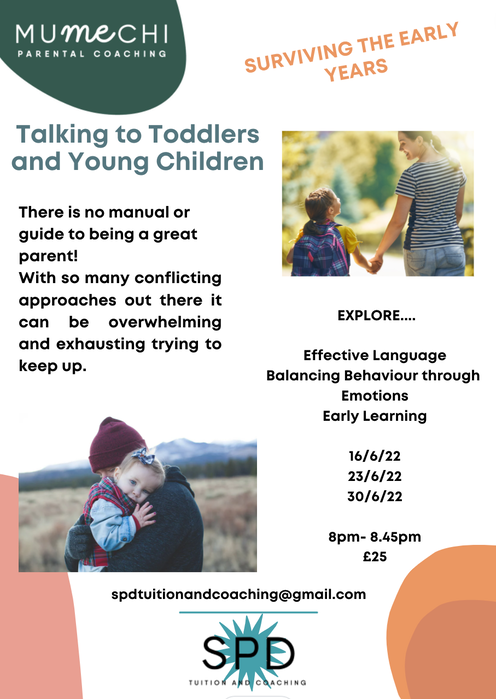
Contact:
Samantha Dholakia
Founder, Coach, Consultant, Trainer
SPD Tuition And Coaching
Tel: 07884271025
Email: spdtuitionandcoaching@gmail.com
https://spdtuitionandcoaching.co.uk
https://spdtuitionandcoaching.co.uk
